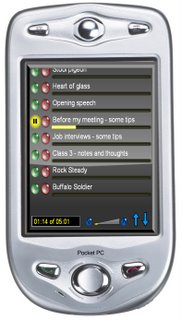We currently own about 300 PDAs, and have had to set up and manage more than that number for other people as well. It makes you very aware of every step of the way, when it comes to setting up the devices, pre-installing good software, and getting them ready to give to learners.
Here are a couple of top tips we have found helpful:

1: storing them safely, and keeping them charged
this was our biggest logistical challenge, and we spent quite a while looking for commercial alternatives, but in the end we did it ourselves
We bought a large, lockable, metal cupboard; drilled air-vents and cable slots in the back; and ran extension leads into the multiple shelves. At first we were worried about too much power drain, but in fact the power drain is really minimal, and the cicuit copes fine with the load.
(thanks to Dom who made it, and Santa who manages it!)
2: installing the same software and settings to multiple devices:
This is ridiculously time consuming, unless you have discovered backing up and restoring to your SD card. Your PocketPC has an integrated backup utility - probably somewhere like Start / Programs / XBackup.
- First, set up one device with all the settings / themes / contacts you need.
- Then use the backup software to back up the entire device to an SD Card.
- Then put the card in a new PDA, and use the same program to restore. This will replace all files and settings with those of the earlier device.
- (of course, if you have different types of PDA, this may not be advised. It works fine when they are all the same)
3: Unlocking / upgrading / supporting different PocketPCs

The more years pass, the more different brand labels I see on different devices. And the more I struggle to know which is which! But there has been one constant: the fantastic xda-developers.com. If you want to figure out your Blue Angel from your Wizard, have a look at the wiki (at wiki.xda-developers.com). You get the low down on which model is which
And what about support? From our experience, we have NEVER had decent technical support from ANY of the phone companies who have supplied the devices. This is because, very often, the support desk has never even seen the devices. They get made in Taiwan by HTC, and then come straight to you. If you want technical tips you need to rely on the world-wide community. So, for tips on how to upgrade the operating system, or fix a problem you are having try the forums (at forum.xda-developers.com). They are great.







